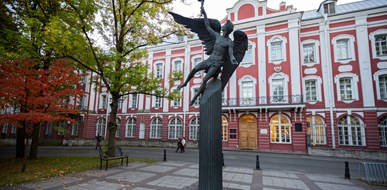[New blog post] Weaponising Russia’s Memory Law: On Russia’s anti-war dissidents
Published 11 July 2023
@Shutterstock - Saint Petersburg University. Historian Mikhail Belousov was dismissed from his teaching position at the Saint Petersburg University for criticising Russia's war against Ukraine.
In a new blog post for Verfassungsblog, researchers Andrii Nekoliak (Asser Institute) and Elizaveta Klochkova (OVD-Info), describe how the Russian Federation is using a “memory law” to put pressure on potential critics of the Russian attack on Ukraine. This Russian law is used to create a mood of paranoia and fear among the population, and a feeling as if the country were in a besieged fortress. The authors think that Russian regime may increasingly use Article 354.1 to purge anti-war dissent.
On June 26, 2023, the Regional Branch of the Investigative Committee of Russia started a criminal investigation against historian Mikhail Belousov for allegedly rehabilitating Nazism. This investigation came shortly after Mr. Belousov's dismissal from his teaching position at Saint Petersburg University for criticising Russia's war against Ukraine. The criminal case against Mr. Belousov exemplifies the increasingly restrictive environment for anti-war dissent in Russia, helped by recent legislation, according to authors Nekoliak and Klochkova.
In March 2022, Russia's parliament introduced amendments to criminal and administrative codes aimed at curbing anti-war protests. These amendments criminalised discrediting the Russian armed forces, spreading false information about the military, calling for sanctions against Russia, and engaging in public actions that tarnish the army's reputation.
In April 2022, a historical memory law was enacted, prohibiting comparisons between Soviet actions and those of Nazi Germany during World War II. Moreover, another Russian law of 2014 (Article 354.1 of the Criminal Code) already before punished the denial of the Soviet Union's role in defeating Nazi Germany and its humanitarian mission during the liberation of European countries.
Memory laws to suppress anti-war dissent
According to Nekoliak and Klochkova, the activation of Article 354.1, which forbids the rehabilitation of Nazism, shows a trend in which the Russian regime employs historical memory laws to suppress anti-war dissent. Since the beginning of 2023, there have been 23 criminal cases involving charges under this article, with twelve new cases emerging in May and June 2023 alone. The use of Article 354.1 serves as a means to augment charges against individuals and impose harsher penalties, particularly targeting those with historical speech related to anti-war sentiments.
Several ongoing criminal cases show the deliberate prosecutorial strategy of utilising Article 354.1 to target anti-war dissenters. Instances include charging individuals for spreading information about the USSR's role in World War II or making critical statements about Russia's war in Ukraine. The Nobel Prize-winning "Memorial" organisation, known for its anti-war stance and human rights advocacy, has also faced pressure from authorities, with criminal charges filed against its leaders and the organisation itself.
Instilling fear and anxiety
By employing the rehabilitation of Nazism article, the Russian authorities instil fear and anxiety in society, presenting it as a legitimate response to societal concerns. However, the current prosecutorial practices reveal that these memory laws are primarily used to punish anti-war dissent rather than combat hate speech crimes. The cases involving Article 354.1 offer valuable insights into the workings of the criminal justice system and memory politics in Russia, showcasing the government's efforts to suppress opposition and control historical narratives.
Read the full blog post.
Andrii Nekoliak is a MEMOCRACY Postdoctoral Researcher at the T.M.C. Asser Instituut. He holds a Ph.D. in political science from the University of Tartu (Estonia), having defended a thesis on ‘Memory Laws’ and the Patterns of Collective Memory Regulation in Poland and Ukraine in 1989-2020: A Comparative Analysis. In his research for the MEMOCRACY project, he will focus on the politics of memory in Ukraine and Russia.
Andrii is part of the research strand In the public interest: accountability of the state and the prosecution of crimes, which examines the accountability of states in the context of counter-terrorism, and the prosecution of individuals for international and transnational crimes in the public interest. The research strand further investigates the role of journalists, the (new) media, human rights NGOs and academics in protecting and promoting public interest standards.
About the MEMOCRACY project
The proliferation of memory laws and policies in Central and Eastern Europe (CEE) has instigated a contemporary culture war in Europe, a clash concerning the meaning of the past for present European identities. The MEMOCRACY project seeks to address this democratic dilemma and the related legal and political challenges in the context of contemporary Europe. The term ‘memocracy’, coined for the purposes of this study, means ‘ruling on the basis of memory’.
